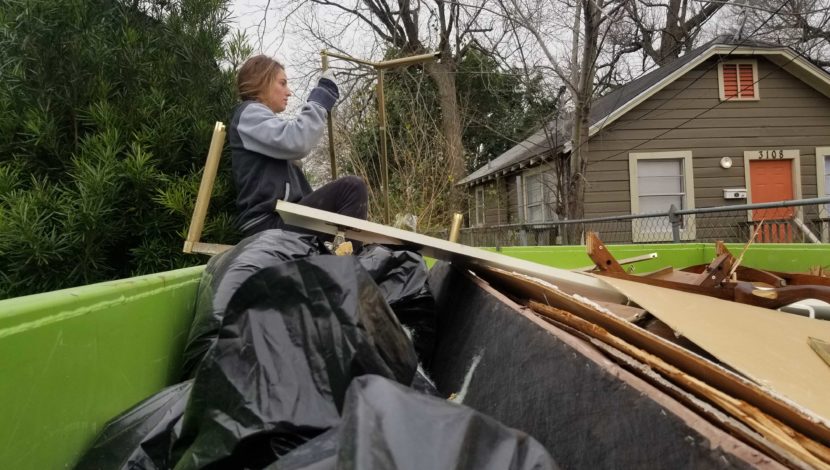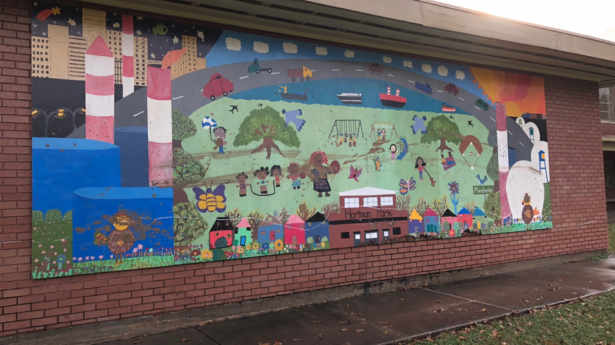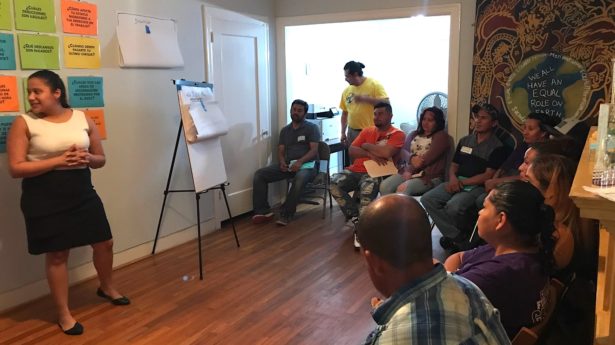The Unitarian Universalist Service Committee advances human rights through grassroots collaborations.
Community-Led Recovery after Hurricane Harvey

By Syma Mirza on May 7, 2019
One drizzly day in the Kashmere Gardens neighborhood of Houston last November, I sat in the senior center at the local municipal services center with Reverend James Caldwell, a community leader, minister, and founder/director of the Coalition of Community Organizations (COCO). Since April 2018, UUSC has been supporting COCO’s work to identify and provide relief and recovery assistance to those living in low-income, predominantly black neighborhoods impacted by Hurricane Harvey. As in all of our work, UUSC strives to center the voices and experiences of those most affected and to strengthen the groups organizing themselves to protect their rights.
COCO is a longstanding community organization addressing the health, environmental, civic, and other social concerns of Houston-area residents, with a primary focus in the Fifth Ward and Kashmere Gardens. Since Hurricane Harvey hit in August 2017, COCO has worked to secure and distribute donations to residents in need of short-term and long-term support, as well as collaborated with other relief providers to repair and rebuild homes. Aid from the Federal Emergency Management Agency (FEMA) is often the only major source of support for these communities, and residents have little recourse if their claim is denied for any variety of reasons such as title issues (for more information on this, see our earlier blog post). Another UUSC partner, West Street Recovery (WSR), formed in the aftermath of Harvey to galvanize communities toward an equitable recovery, connected with COCO and put in the time and labor to muck and gut several houses so seriously damaged by flooding that they had to be almost completely rebuilt. The mucking and gutting process is not only physically labor-intensive but often emotionally painful for homeowners and their families, requiring a deep level of trust that relief providers must earn over time.
Rev. Caldwell and I sat down and spoke with Ms. Johnson, an 84-year-old woman whose house was flooded and bathroom heavily damaged, about the holes still remaining in her ceiling 15 months after Harvey. Despite having insurance, Ms. Johnson had not been able to find money to repair the ceiling, raising moisture and mold-related health and safety concerns. While we talked, word soon got out that Rev. Caldwell was in the building. One by one, several people left their bingo game and approached us and asked, “Are you the guy fixing roofs?” Rev. Caldwell chuckled and listened to each of their stories, took down everyone’s name and number, and promised to be in touch.
Clearly, there was, and still remains, unmet and unidentified need as we approach the two-year mark since Hurricane Harvey. Some people in Kashmere Gardens and other similarly situated neighborhoods are continuing to live in conditions involving water damage and mold. COCO focuses on helping those most vulnerable, such as seniors, people living with disabilities, veterans, families with children, single-parent households, and/or those living on a fixed income who have been particularly hit hard and have had difficulty accessing assistance. With modest support from UUSC and collaboration with other key local organizations and relief providers such as West Street Recovery, COCO has been able to help facilitate the repair or rebuilding of the homes of at least 40 people in Houston.
Community Member Profile: Sergeant Dudley Boudreaux
A Vietnam war veteran in his late sixties overcoming post-traumatic stress disorder, cancer, and a number of other health issues, Sgt. Boudreaux’s house in the Fifth Ward was badly flooded during Harvey, damaging his floors and walls. His FEMA claim was denied due to title issues because the house was legally in the name of a deceased parent. Given his pre-existing relationships in the community, Rev. Caldwell learned of Sgt. Boudreaux’s situation and facilitated a meeting with West Street Recovery at Sgt. Boudreaux’s home. It quickly became clear that the $2,000 proposed by COCO towards some small repairs to make the home more livable amounted to, “putting a band-aid on a gunshot wound,” as Rev. Caldwell put it. For one, Sgt. Boudreaux had been living without hot water for 18 months. With an additional $21,000 and critical labor facilitated by WSR, combined with donations of appliances and furniture from other aid organizations, COCO and WSR worked together to rebuild and refurbish Sgt. Boudreaux’s home over a four-month period. Living Hope Wheelchair Association, another UUSC partner, donated the materials and time to build a wheelchair ramp. Initially suspicious and, “on the brink of losing all hope,” Sgt. Boudreaux is now a transformed person. Rev. Caldwell describes him as changed mentally, psychologically, and physically, having seen West Street Recovery “go the extra mile” for him and his home. He is expected to move back into his house in May 2019.
This case illustrates how in the face of a daunting disaster like Harvey and overwhelming need, small grants to small organizations can have outsized impact. COCO’s longstanding inroads in the community have enabled it to identify some of those most in need and refer them to organizations able and willing to assist such as WSR. Ben Hirsch of WSR has commented that the cases referred by COCO are in some of the worst shape the organization has seen. Due to the intensive nature of the work required to rehabilitate or rebuild homes referred by COCO, WSR is only able to take one to two of these cases at a time. The trust Rev. Caldwell has built over the years in the community has enabled COCO to reach those individuals unable to navigate complicated aid processes and left without hope.
UUSC’s focus with crisis response, and Harvey in particular, has been to channel resources to vulnerable communities that have been disproportionately impacted by the storm yet struggle to access resources for recovery. Stories such as these show that modest support can make a real difference in people’s lives.
Photo Credit: West Street Recovery
***
About UUSC: Guided by the belief that all people have inherent worth and dignity, UUSC advances human rights globally by partnering with affected communities who are confronting injustice, mobilizing to challenge oppressive systems, and inspiring and sustaining spiritually grounded activism for justice. We invite you to join us in this journey toward realizing a better future!

